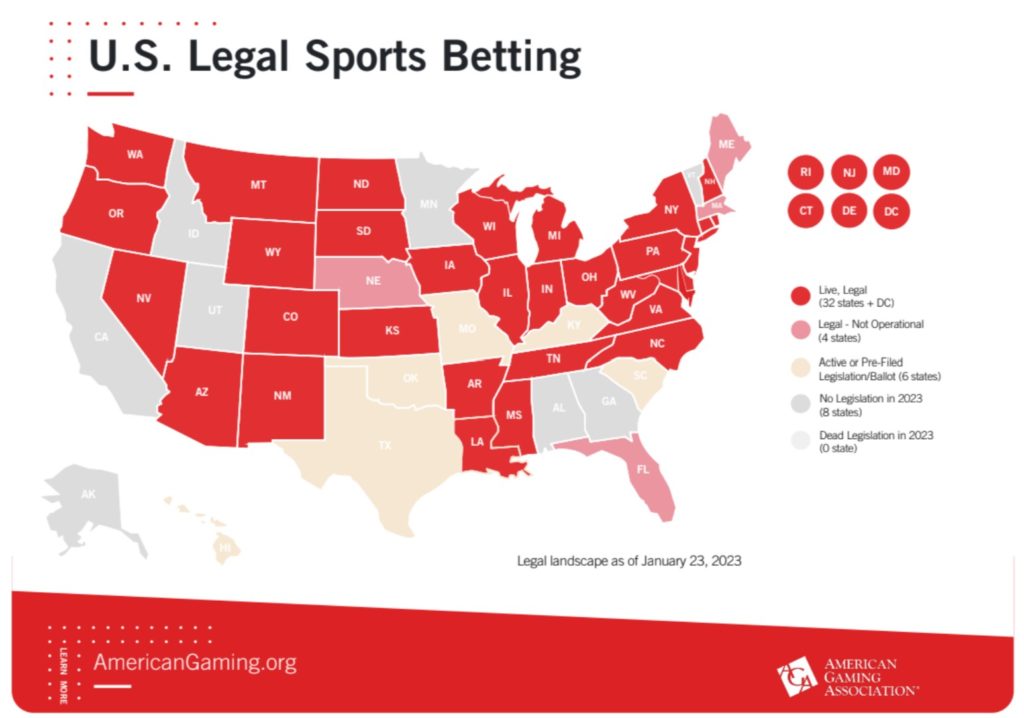Parlay, yea or nay? Navigating the newly legalized sports betting market in Ohio
The Dayton Flyers lost to the VCU Rams Jan. 13 at home, which sparked online threats from sports betters who lost money on the close game. Photo by of Keegan Gupta, director of digital media & photography.
Zoë Hill | Print Editor-in-Chief
Max Cross | Sports Editor
A lot is on the line each time the Flyers take to the court. But now, with sports betting legalized in Ohio, dollar signs loom over each basket.
The state passed legislation in December 2021 to legalize sports gambling, which took effect on Jan. 1 of this year. The legislation came in reaction to the 2018 Supreme Court case that struck down the federal ban on sports gambling. Since the lift, 36 states have legalized it, and six states have active legislation or ballot initiatives to do the same, according to the American Gambling Association.
The legalization of sports betting has garnered mixed reaction within the campus community, as the consequences— both positive and negative— begin to reveal themselves.
For the Flyers, sports betting could “really change the landscape of what college sports is all about,” according to Anthony Grant, University of Dayton men’s basketball head coach. Grant came into a Jan. 17 post-game press conference with a somber message toward sports bettors.
“I have to say something because I think it’s just necessary at this point,” Grant said. “You know, these young men, we’re asking them to sacrifice quite a bit for us to be able to do what we do and enjoy what we enjoy. So I’m just asking all the Flyer fans just to understand that we’re dealing with 18-, 21-, 22-year-olds, and this is about them. This is about them.”
Grant said the focus should be on “what’s in the best interest of the kids, what’s in the best interest of this university and this proud program and this community that loves the Flyers.” A tough 63-62 loss to VCU on Jan. 13 left some gamblers angry with UD’s performance.
“There’s some laws that have recently been enacted, that really to me— it could really change the landscape of what college sports is all about,” Grant said. “And when we have people that make it about themselves and attack kids because of their own agenda, it sickens me. They have families. They don’t deserve that. Mental health is real.”
The coach did not elaborate on any specific incidents at the press conference, but UD athletic director Neil Sullivan played a clip of one of the messages he received for Dayton Daily News reporters.
“You had the lead with two minutes left,” the voice said. “That’s not comfortable. People will go down. Heads will roll for what happened tonight, I promise you that!”
According to the Dayton Daily News, Sullivan said some of the messages told players to “go kill yourself” and some were turned over to the police.
Sullivan, in a statement to Flyer News, echoed Grant’s emotional plea.
“These are young kids, and I’m not going to add too much to what Grant said, but I’m the paid adult,” Sullivan said, “If someone’s getting mad, they can get mad at me. They know where to find me. They’ve found me many times.”
Grant’s remarks were noticed and addressed by Ohio Casino Control Commission executive director Matt Schuler at a commission meeting Jan. 18. Schuler threatened sports betting bans for people who attack players through social media.
“Dayton Flyers coach Anthony Grant recently used his post game press conference to address hate messages sent to his players received in recent days from gamblers upset about their losses,” Schuler said. “This type of behavior is not okay for anybody, in any venue— at all.”
Sullivan was one of multiple Ohio athletic directors who met with lawmakers before the legislation passed, according to the Dayton Daily News. He had concerns of people attacking young players online over lost bets.
Grant said real Flyer fans need to “Take a step back, and reevaluate your priorities. And if you can’t, we don’t need you. We don’t need you.”
UD alum Casey Clark ’99 is a Flyer fan through and through. He also works for the American Gambling Association as the senior vice president and deals with the communication around a responsible sports betting industry.
Clark said threats and online harassment is a sign someone has a serious gambling problem, and called the aftermath of the VCU game “unacceptable.”
“There is zero daylight between the way the industry feels about that, the way Coach Grant feels about that, and how the Ohio regulator feels about that,” Clark said.
As one of the most regulated in the country, the gambling industry uses a “know your customer” system to validate users before they can place bets. This includes looking at consumer gambling tendencies and financial standings to ensure they have the means to place a bet and aren’t showing signs of gambling addiction. The same regulations don’t apply to online trolls, Clark said, which is why the issue can’t be shaved down to a problem with the gambling industry.
“These are problem gamblers hiding anonymously in a communication vehicle that is… cowardly,” Clark said. “It’s a clear indication that they have a real gambling problem, and my educated guess, for being in this business for a long time, is that these are people who didn’t start betting on Jan. 1.”
He said the amount of money lost that would make people react this way indicates they are betting outside of their means, possibly betting on credit through illegal sports books and not following the protocols advocated for by the AGA.
The legalization in Ohio and other states across the country didn’t create sports betting, just the opportunity for sports fans to bet legally, according to Clark.
“Americans have been betting on sports as long as there have been sports to bet on,” Clark said. “What’s changed is that we’re giving Americans who want to bet on sports an opportunity to do that in a much safer way.”
“If people are going to bet on sports, we should create legal frameworks to protect them and give people the opportunity to do that and help migrate bettors away from the pervasive and predatory illegal market into the protections of the legal,” he added.
The AGA believes each market should decide for themselves if, when and how to legalize sports betting. What’s right for Ohio, may not be right for Pennsylvania, Indiana and Kentucky, Clark said.
State regulators consult the AGA on their responsible marketing code, and the association runs responsible gambling campaigns, among other operations. Clark said education is a key piece of the puzzle for combating illegal betting and instances like the fallout from the UD/VCU game.
The AGA’s award-winning Have A Game Plan.® Bet Responsibly.™ campaign partners with dozens of sports leagues, teams and sports books including NASCAR, the NHL, the NBA, the New York Knicks, DraftKings and Barstool Sportsbook, to name a few. The campaign aims at providing resources that Clark believes are needed to equip people interested in sports betting.
He, in line with the campaign, advised sports fans to follow a few guidelines when deciding to place bets. Bettors should set a budget and stick to it, know the odds and rules of the game, and only play with licensed and trusted sportsbooks. He also stressed the importance of understanding sports betting is for entertainment and should be played socially with friends and family.
“Fundamentally, sports betting is entertainment for adults,” Clark said. “It should be treated as something for adults as something that’s supplemental to a way that they’re enjoying sports, not distracting from how you’re enjoying or changing how you’re engaging in that content. It should be adding to the experience. It should be entertaining. And if any of that is not true, you should stop.”
These resources are in large part sponsored and paid for by the gambling industry because it wants to make sports betting sustainable, and that can’t happen if people aren’t having fun and betting outside of their means, Clark said.
In addition to gambling regulations and responsible betting resources, there are also tools available to bettors to keep sports betting fun, according to Clark. Budgeting and time restriction tools exist for the purpose of making the game sustainable and enjoyable.
With the legalization of sports betting, Clark said he wants conversations around responsible betting to continue, especially in strong sports communities like the one here in Dayton. Having difficult conversations about things like gambling can help bring awareness to responsible resources similar to how college communities discuss alcohol use, he said.
“There’s a stigma to gambling; there’s confusion about gambling,” Clark said. “…Bringing this conversation to the table and putting it in print and talking to your peers about it is really important… We should put it on the table and have a conversation so that people know they are equipped with the resources to deal with it.”

For more resources on how to sports bet responsibly, visit https://haveagameplan.org/.
For more sports news, like Flyer News on Facebook and follow us on Twitter (@FlyerNews & @FlyerNewsSports) and Instagram (@flyernews.

